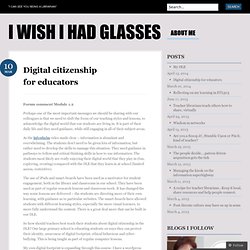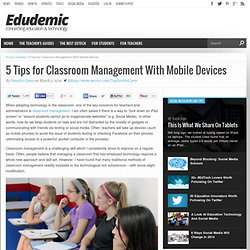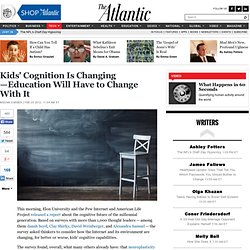

Digital citizenship for educators. Forum comment Module 1.2 Perhaps one of the most important messages we should be sharing with our colleagues is that we need to shift the focus of our teaching styles and lessons, to acknowledge the digital world that our students are living in.

It is part of their daily life and they need guidance, while still engaging in all of their subject areas. As the Infowhelm video made clear – information is abundant and overwhelming. The students don’t need to be given lots of information, but rather need to develop the skills to manage this situation.
They need guidance in pathways to follow and critical thinking skills in how to use information. The use of iPads and smart-boards have been used as a motivator for student engagement, both in the library and classrooms in our school. 5 Tips for Classroom Management With Mobile Devices. When adopting technology in the classroom, one of the key concerns for teachers and administrators is classroom management.

I am often asked if there is a way to “lock down an iPad screen” or “ensure students cannot go to inappropriate websites” (e.g. Social Media). In other words, how do we keep students on task and are not distracted by the novelty of gadgets or communicating with friends via texting or social media. Often, teachers will take up devices (such as mobile phones) to avoid the issue of students texting or checking Facebook on their phones (eliminating access to a powerful, pocket computer in the process). Classroom management is a challenging skill which I consistently strive to improve on a regular basis. Establish Clear Expectations Just as I start out the school year with “Class Rules” that we make and agree to as a group, we also establish expectations for when we use technology. Let them “Get the Giggles Out” Engagement is Key Two Eyes, Two Feet.
What should students learn in the 21st century? By Charles FadelFounder & chairman, Center for Curriculum Redesign Vice-chair of the Education committee of the Business and Industry Advisory Committee (BIAC) to the Organization for Economic Co-operation and Development (OECD)Visiting scholar, Harvard GSE, MIT ESG/IAP and Wharton/Penn CLO It has become clear that teaching skills requires answering “What should students learn in the 21st century?”

On a deep and broad basis. Kids' Cognition Is Changing—Education Will Have to Change With It - Megan Garber - Technology. This morning, Elon University and the Pew Internet and American Life Project released a report about the cognitive future of the millennial generation.

Based on surveys with more than 1,000 thought leaders -- among them danah boyd, Clay Shirky, David Weinberger, and Alexandra Samuel -- the survey asked thinkers to consider how the Internet and its environment are changing, for better or worse, kids' cognitive capabilities. The survey found, overall, what many others already have: that neuroplasticity is, indeed, a thing; that multitasking is, indeed, the new norm; that hyperconnectivity may be leading to a lack of patience and concentration; and that an "always on" ethos may be encouraging a culture of expectation and instant gratification.
It also offers its experts' predictions about what the most-desired life skills (for young people, but ostensibly for everyone else, too) will be in the year 2020. Digital learners.